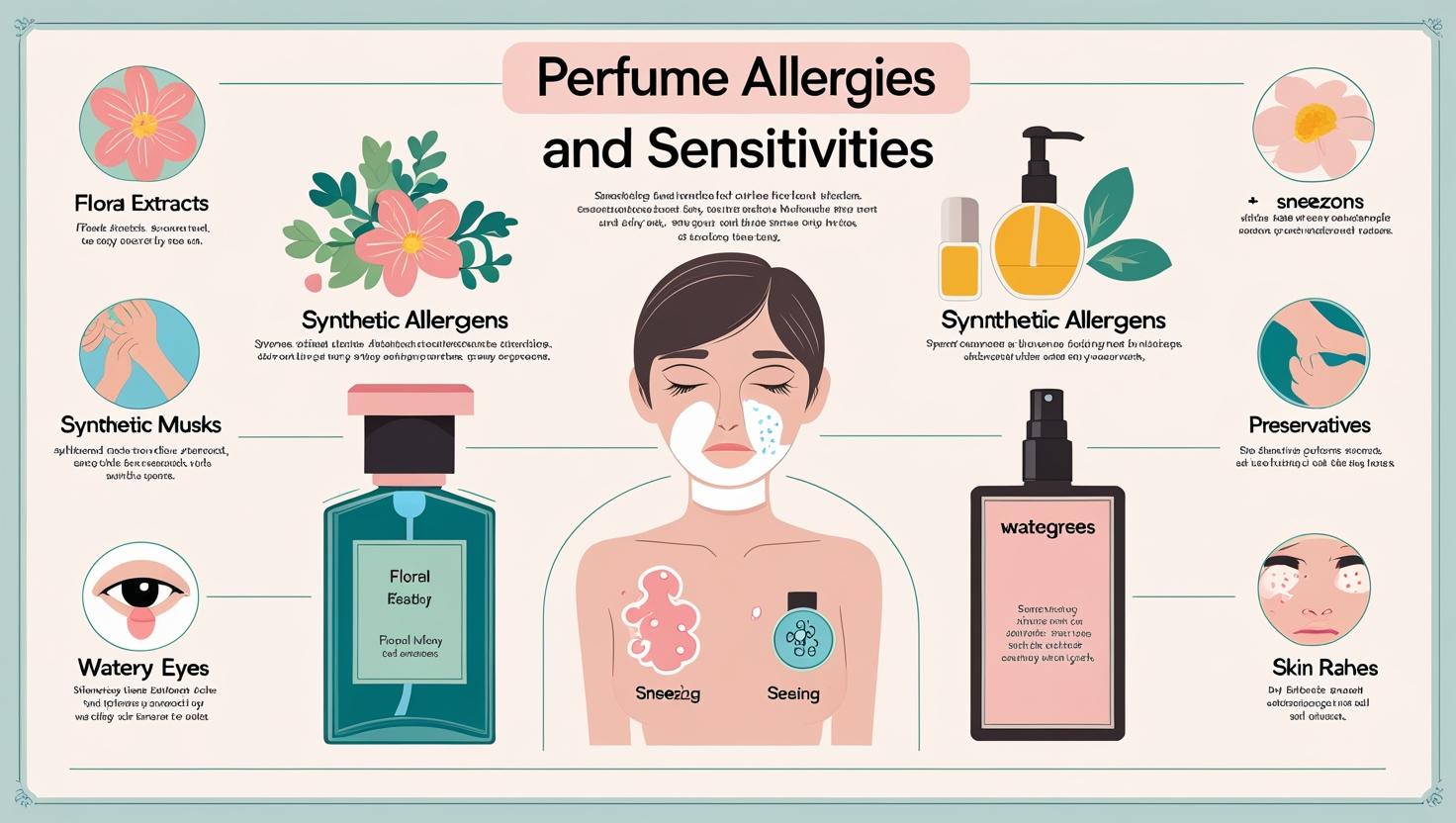Perfume Allergies & Sensitivities: What You Need to Know

Does perfume make your skin itch or cause sneezing? Many people experience fragrance allergies and sensitivities. This blog will explain triggers, symptoms, and ways to manage them.
Stay here to learn how to protect yourself!
Key Takeaways
- scent allergies cause skin redness, itching, and sneezing. Severe cases may lead to asthma or skin annoyance
- Common triggers include synthetic fragrances, essential oils, alcohols, preservatives, and odoriferous products like candles or detergents.
- To manage symptoms, use odorless items, test new products on small areas of skin, and avoid strong smells in public places.
- Treatments include OTC antihistamines, air purifiers with air purifiers, patch testing for triggers, and medical advice for severe reactions.
- Avoid perfumes if sensitive. Look for labels saying “odorless ” or “unscented” to reduce annoyance caused by hidden ingredients.

What Are Perfume Allergies and Sensitivities?

odor allergies happen when your immune system reacts to certain chemicals in fragrances. Sensitivities are less severe but can still cause annoyance like headaches or skin redness.
Difference Between Allergy and Sensitivity
Allergies involve the immune system. A true allergy triggers immunoglobulin E (IgE) antibodies and causes allergic reactions like itchy eyes, skin redness, or difficulty breathing.
Sensitivities don’t use IgE but still cause discomfort—like headaches, nasal allergies, or discomfort.
A fragrance sensitivity often comes from odoriferous products like perfumes, air fresheners, or cleaning products. Allergies can lead to severe symptoms such as allergic skin annoyance or asthma attacks.
Both need attention to avoid common triggers in perfumes….
Common Triggers in Perfumes
Perfumes can cause allergies or sensitivities for some people. Certain ingredients and products are common triggers.
- Synthetic Fragrances: Many perfumes contain artificial scents that irritate the skin or nose.
- Essential Oils: These natural oils can cause allergic reactions like skin redness or itching.
- Alcohols: Alcohol in perfumes may dry out skin, leading to discomfort
- Preservatives: Chemicals used to extend shelf life can trigger skin discomfort
- Fixatives: Ingredients like musk are added to make scents last longer but may harm sensitive skin.
- odoriferous products : Items such as air fresheners, laundry detergents, and scented candles often share similar allergens found in perfumes.
Now, let’s explore symptoms of aroma allergies.
Symptoms of aroma Allergies
aroma allergies can cause skin redness, itching, or swelling. Some people get hives or contact dermatitis after touching odoriferous products like perfumes and colognes. Common signs include a runny nose, itchy eyes, watery eyes, or breathing difficulties.
Stuffy noses and sneezing are also frequent allergy symptoms. Severe reactions may trigger asthma attacks or make eczema worse. These issues often occur with fragrances in air fresheners, laundry detergents, or personal care products.
Moving on—how to manage scent allergies effectively?
How to Manage and Prevent scent Allergies
Use odorless products and avoid strong scents. Try air filter to reduce irritants in your space.
Tips for Avoiding Triggers
Fragrance lovers with allergies need to avoid triggers. Simple changes can help prevent reactions.
- Choose fragrance-free products like cleaning supplies and personal care items.
- Avoid odor eliminators scented candles, and deodorizers in your home.
- Switch to laundry detergents labeled as unscented or hypoallergenic.
- Test new perfumes on a small patch of skin. Watch for redness or irritation within 24 hours.
- Use an air filter with air purifiers to reduce airborne particles that cause sensitivity.
- Stay away from spaces with strong smells, including stores selling perfumes and colognes.
- Wash clothes after visiting places with heavy fragrances to remove lingering bouquet
- Limit exposure to essential oils often found in odoriferous products, since they can be strong irritants.
Treatment Options
Managing bouquet allergy or sensitivity requires the right approach. Follow these steps to find relief and prevent severe symptoms:
- Use odorless products
Choose items like unscented personal care products or cleaning products. Look for labels that say “odorless to avoid hidden triggers. - Try allergy medications
Over-the-counter antihistamines can reduce skin redness, itchy eyes, or a stuffy nose. Consult your doctor for long-term use. - Switch to air cleaners
Install air purifiers in your home or workplace. These can remove airborne allergens from scented candles or fragrance dispensers. - Apply dermal test
A Skin dermal test helps identify specific triggers. Ask an allergist if you suspect multiple chemical sensitivities. - Seek medical advice for severe allergic reactions
If symptoms like breathing difficulties occur, visit a healthcare provider immediately. - Avoid odoriferous products altogether
Skip perfumes, colognes, and laundry detergents with scents. Opt for baking soda-based alternatives instead. - Consider immunotherapy options
Allergy shots may help some with hay fever or allergic rhinitis tied to perfume exposure. - Limit skin irritation risks at work
Use gloves when handling items with essential oils or other common allergens that may irritate the skin. - Follow peer-reviewed studies on solutions
Research shows some treatments are more effective than others depending on your condition type and severity levels. - Focus on seasonal allergies management as well
Control conditions like asthma triggered by strong bouquet during sensitive months with prescribed care plans created by professionals specializing in allergy treatment fields to help patients recover efficiently!
Conclusion
Perfume allergies can be tricky, but they are manageable. Avoid scented products like perfumes, laundry detergents, or fragrance dispensers if they trigger you. Look for fragrance-free products to stay safe.
dermal test help identify allergens quickly. Take allergy medication if symptoms persist—always consult a doctor first.
FAQs
1. What causes fragrance sensitivity or odor allergies?
Fragrance sensitivity and scent allergies happen when certain chemicals in odoriferous products like perfumes, fragrance dispensers, or cleaning products irritate the skin or trigger an allergic response.
2. What are common symptoms of a fragrance allergy?
Symptoms include itchy eyes, runny nose, watery eyes, stuffy nose, skin redness, contact dermatitis, breathing difficulties, and even asthma exacerbations.
3. How can I manage symptoms caused by scented products?
Use unscented or fragrance-free products like laundry detergents and personal care items. air sanitizer can also help reduce airborne irritants at home.
4. Can natural scents like essential oils cause reactions too?
Yes. Essential oils can still lead to skin inflammation or allergic responses in sensitive individuals due to their strong chemical compounds.
5. How do doctors test for scent allergies?
Doctors may perform patch tests to identify specific allergens causing irritation or conduct evaluations for conditions like non-allergic rhinitis or mast cell activation syndrome.
6. Are there ways to prevent reactions from scented candles and similar items?
Avoid using scented candles and opt for alternatives like baking soda for bouquet control instead of fragranced fragrance dispensers that might worsen sensitivities.





